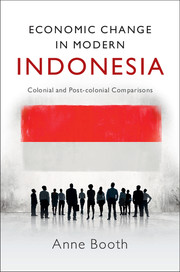Book contents
- Frontmatter
- Contents
- List of tables
- Acknowledgements
- 1 Introduction: Indonesia's three watersheds
- 2 The colonial legacy
- 3 Occupation, liberation and the challenges facing the new republic, 1942–66
- 4 Suharto's economic record: successes and failures
- 5 The 1997–98 crisis and its legacy: dropping out again?
- 6 The SBY years: building a new Indonesia?
- 7 Economic nationalism, economic rationalism and the development of private business after 1950
- 8 Trends in poverty and income distribution: the Suharto era and beyond
- 9 The changing role of government from the colonial era to the post-Suharto years
- 10 Conclusions
- Bibliography
- Index
1 - Introduction: Indonesia's three watersheds
Published online by Cambridge University Press: 05 February 2016
- Frontmatter
- Contents
- List of tables
- Acknowledgements
- 1 Introduction: Indonesia's three watersheds
- 2 The colonial legacy
- 3 Occupation, liberation and the challenges facing the new republic, 1942–66
- 4 Suharto's economic record: successes and failures
- 5 The 1997–98 crisis and its legacy: dropping out again?
- 6 The SBY years: building a new Indonesia?
- 7 Economic nationalism, economic rationalism and the development of private business after 1950
- 8 Trends in poverty and income distribution: the Suharto era and beyond
- 9 The changing role of government from the colonial era to the post-Suharto years
- 10 Conclusions
- Bibliography
- Index
Summary
Indonesia's three watersheds
Many countries have had, at some point in their history, watershed moments when the opportunity seems to arise to wipe the slate clean and make a new beginning. Such moments often arise after wars or after revolutions or some other political upheaval which lead to a regime change, and the chance to start afresh. Typically at such times, new policies are introduced which seek to bring about political, economic, constitutional, administrative or social change, or some combination of all these. Not infrequently, reforms which most observers would have thought impossible under the old regime are implemented with surprising rapidity and apparently with little opposition. In many parts of Asia and Africa, such a watershed moment occurred with the granting of political independence. Beginning with the decision by the American government to grant the Philippines full independence in 1946, all the major states of Asia had achieved either self-government or full political independence by 1960.
The Indonesian struggle for independence began in the immediate aftermath of the Japanese capitulation to the Allied powers in August 1945. Two key leaders of the independence struggle, Sukarno and Hatta, under considerable pressure from younger, more radical activists, declared Indonesia's independence on 17 August 1945, a date that has been enshrined as Indonesia's national independence day ever since. But in the aftermath of this declaration, the transfer of power to an independent government in Indonesia did not take place smoothly. The Dutch officials who had fled to Australia when the Japanese armed forces swept through the archipelago in 1942 returned in the wake of the British army in the latter part of 1945. Even the more progressive among them were determined to re-establish Dutch control over the entire archipelago and regarded the leaders of the independence movement, especially Sukarno and Hatta, as little more than lackeys of the Japanese who had no support among the Indonesian masses. These opinions were supported by almost the entire population of the Netherlands who feared that ‘the loss of the Indies’ would spell ruin for the Dutch economy, already severely weakened by the German occupation. It took more than four years of armed struggle and negotiations brokered by foreign powers and the infant United Nations before the Dutch finally recognised that they could no longer withstand the winds of change sweeping across Asia.
- Type
- Chapter
- Information
- Economic Change in Modern IndonesiaColonial and Post-colonial Comparisons, pp. 1 - 11Publisher: Cambridge University PressPrint publication year: 2016



